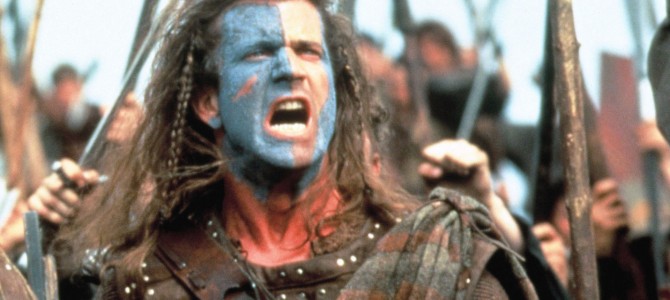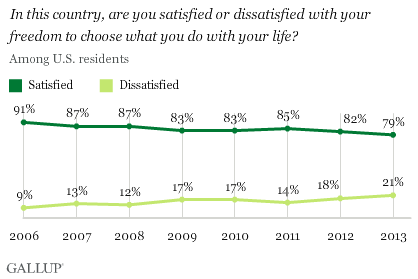A new Gallup poll finds that fewer Americans are satisfied with the freedom in their lives compared to seven years ago—dropping 12 percentage points from 91 percent in 2006 to 79 percent in 2013. During that same time, the percentage of Americans dissatisfied with the freedoms available in their lives more than doubled, from 9 percent to 21 percent. The United States now sits in 36th place among the world in our admiration of the idea of freedom.
It’s fair to mention that the definition of “freedom” has become increasingly pliable. (It is, for example, regularly argued that one person’s unwillingness to pay for another person’s contraception is a restriction of the latter person’s freedom.) What is bothersome, though, is that nearly a quarter of us would feel comfortable telling a complete stranger that our own “freedom,” in the broadest sense, is an overrated concept.
You can imagine, considering how we vote, that many more people believe the same thing. And I would argue that a majority of Americans admire theoretic freedom far more than they do the real thing. Gallup offers no breakdown of the ideological inclination of those dissatisfied with the choices available to them, so we are only left to guess.
Gallup claims that decline in freedom-loving could probably be attributed to the weak U.S. economy. It is plausible that this is part of the reason. The political class has used populist progressive myths about freedom’s role in inequity, unfairness, racism, and poverty so regularly and effectively that there is little doubt many people, especially young people, have started believing them. (Update – Some comments point out that the poll specifically points to the freedoms available in their lives, not freedom itself. While this is true, I believe the Gallup questions are broad enough to be a reflection of what we think of freedom in general.)
And T. Becket Adams make interesting observation in the Washington Examiner, pointing to another Gallup poll that found Americans now have more confidence in the police and military than they do any of the three branches of government. Adams contends “this isn’t exactly a healthy place to be in a constitutional republic,” and I certainly agree. Gallup also found a 20-point increase in Americans who believe government is corrupt. This, more or less, mirrors Washington’s actual levels of corruption. And with the array of scandals (some undoubtedly imagined, while others very real), the widespread incompetence and cronyism, many Americans deem Washington to be one of the biggest problems facing the country today. This also is almost certainly part of the reason that Americans have become cynical about our system—even though Washington’s charge has been to expand liberty, its actions have served to limit the options of citizens, blunt dynamism, and celebrate risk aversion.
But perhaps the biggest reason we have less confidence in liberty is one we don’t like to talk about. In his final book, The Servile Mind: How Democracy Erodes the Moral Life, the great Kenneth Minogue writes that “traditional societies and totalitarian states of the 20th century suggested that many people are, in most circumstances, happy to sink themselves in some collective enterprise that guides their lives and guarantees them security.” The great argument of our time, and in some sense most times, is the fight to balance liberty and safety. Whenever threatened, whether it by some existential danger or a domestic economic jolt, we almost never choose what we’re told is more chaotic and precarious. We almost always choose what seems safest—and most times it’s not liberty. While George W. Bush’s central purpose was ostensibly tied to an effort that spread and defended freedom—and I stress ostensibly—the huge crowds that gathered and cheered for Obama made no pretense about their cause. They overtly reveled in the idea that we were about to erect a state-sponsored babysitting service. It’s also worth remembering that part of the dissatisfaction Americans have with the president’s job performance these days has to do with his inability to fulfill the promise of transforming government’s role in American life.
This is a depressing thought for a libertarian, and probably for many others, but evidence that human beings opt for less freedom when things get tough isn’t exactly surprising. And this Gallup poll probably doesn’t do the problem justice.
Follow David Harsanyi on Twitter.









